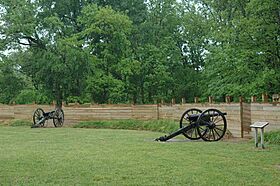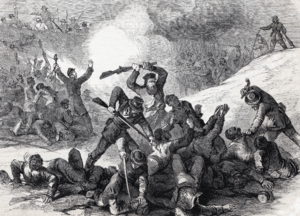Fort Pillow State Historic Park facts for kids
Quick facts for kids Fort Pillow State Historic Park |
|
|---|---|

Cannons at Fort Pillow in 2006
|
|
| Lua error in Module:Location_map at line 420: attempt to index field 'wikibase' (a nil value). | |
| Type | Tennessee State Park |
| Location | Lauderdale County |
| Nearest town | Henning, Tennessee |
| Area | 1,642 acres (6.64 km2) |
| Created | 1971 |
| Open | Year round |
| Website | |
|
Fort Pillow
|
|
| Built | June 6, 1861 |
| NRHP reference No. | 73001806 |
| Significant dates | |
| Added to NRHP | April 11, 1973 |
| Designated NHL | May 30, 1974 |
Fort Pillow State Historic Park is a special place in western Tennessee. It helps us remember an important part of the American Civil War. This park protects the site of the Battle of Fort Pillow.
The park covers 1,642 acres (about 6.6 square kilometers). It is in Lauderdale County. The park sits on the Chickasaw Bluffs, high above the Mississippi River. This location made it very important in history.
In 1861, the Confederate army built strong defenses here. They named the fort after General Gideon Johnson Pillow. During the Civil War, the Union Army held the fort for most of the time. However, after the Battle of Fort Pillow, the Confederate Army briefly took it back. The battle ended with a very sad event. Many African-American Union soldiers and their white officers were killed after trying to surrender. This happened under the command of Confederate Major General Nathan Bedford Forrest.
Contents
About Fort Pillow Park
Today, you can still see parts of the old Fort Pillow's earthworks. These are the dirt walls and trenches that made up the fort. The park also has a museum. It helps visitors learn about the fort's history.
You can enjoy many fun activities at the park. These include camping, picnicking, and fishing. In 1973, the fort's earthworks were added to the National Register of Historic Places. This means they are important historical sites. The fort was also named a National Historic Landmark in 1974.
Fort Pillow During the Civil War
Fort Pillow was very important because it controlled traffic on the Mississippi River. On June 4, 1862, Confederate troops left Fort Pillow. This allowed Union troops to take control of Memphis, Tennessee. The Union Army then occupied the fort. They held it for most of the war.
There was one short time when the Union did not control the fort. This was right after the Confederate victory in the Battle of Fort Pillow. This battle happened on April 12, 1864.
The Battle of Fort Pillow: A Sad Day
The Battle of Fort Pillow was a very tragic event. Of the 262 U.S. Colored Troops fighting, 229 were killed. These were African-American soldiers. There were also 285 white Union soldiers. Records show that about 36% of white soldiers died. But for black soldiers, the death toll was 66%.
A Confederate soldier wrote that General Forrest ordered the black soldiers "shot down like dogs." The killing continued even after they tried to surrender. Many people at the time, including soldiers and journalists, called it an appalling slaughter. Later, Confederates began to disagree with these accounts. However, historians still classify this event as a massacre.
After this battle, "Remember Fort Pillow!" became a powerful battle cry. Black Union soldiers used it for the rest of the Civil War. While many Union soldiers died, Confederate records show about 200 prisoners were sent south.
In 1866, the Union Army created a cemetery near the battle site. It was for both Confederate and Union soldiers. In 1867, about 250 bodies were moved from there. They were reburied at the Memphis National Cemetery.
See also
 | Georgia Louise Harris Brown |
 | Julian Abele |
 | Norma Merrick Sklarek |
 | William Sidney Pittman |


